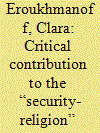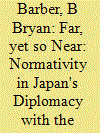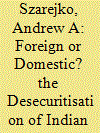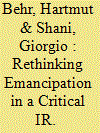|
|
|
Sort Order |
|
|
|
Items / Page
|
|
|
|
|
|
|
| Srl | Item |
| 1 |
ID:
158725


|
|
|
|
|
| Summary/Abstract |
This article theorises the simultaneous enaction of securitising and desecuritising moves. It argues that the frequent simultaneity of these two processes, which are normally considered mutually exclusive within Securitisation Theory (ST), has previously gone unnoticed given a set of methodological, temporal, and ontological biases that have developed within ST. Demonstrating how these biases can be overcome – and even reconciled with the seminal texts of ST – by drawing on work from within social theory and elsewhere, we argue that the frequent simultaneity of (de)securitising moves most urgently requires us to reconsider the normative status of desecuritisation within ST. Although desecuritisation has traditionally been viewed as normatively positive, we argue that its temporally immanent enaction alongside securitising moves might introduce more violence into security politics and, in fact, exacerbate protracted conflicts. Ultimately, we make the normative ambitions of some within ST more opaque. Desecuritisation is not a shortcut to the ethical-political good within ST.
|
|
|
|
|
|
|
|
|
|
|
|
|
|
|
|
| 2 |
ID:
146244


|
|
|
|
|
| Summary/Abstract |
This review essay explores the security–religion nexus by evaluating two books contributing to the “restorative turn” in International Relations (IR) theory and practice. While Securing the Sacred and Religion in the Military Worldwide “bring religion back” into the realm of international politics and security, I argue that the analytical purpose of the books is problematic, given that both studies imply a normative logic to the security–religion nexus. This is difficult for two reasons. First, it rests on an assumption about the resurgence of religion in the world and the conduct of research. Second, it furthers a powerful discourse in which religion has a rightful place in an orderly society. I therefore provide a critical contribution to the security–religion nexus by urging scholars of religion and security to embrace their underlying normative positions.
|
|
|
|
|
|
|
|
|
|
|
|
|
|
|
|
| 3 |
ID:
166802


|
|
|
|
|
| Summary/Abstract |
Japan has been playing a steady and pivotal role in Central Asia since the fall of the Soviet Union, but to presume Tokyo's engagement is predicted on strategic interests that compete with other powers such as Russia and China in the so-called “New Great Game” is naïve to the activities occurring on the ground. Newly independent and largely unaffected by Japanese past aggression, the five Central Asian states present a unique “petri dish” for Japan's values-based diplomacy in Asia. This study analyzes significant Japanese foreign policy measures with the Central Asian republics since independence, and—through examination of speech acts by the political elites, practices on the ground, and within the institutional framework of the Central Asia Plus Japan dialogue—draws out the normativity evident in Tokyo's Central Asian policy. Using a symbiotic framework for foreign policy analysis of geopolitics, geo-economics, and geoculture, this study isolates geoculture from the two other dynamics in order to illustrate how norms operate independently from strategic interests in the region.
|
|
|
|
|
|
|
|
|
|
|
|
|
|
|
|
| 4 |
ID:
188994


|
|
|
|
|
| Summary/Abstract |
Is securitisation normatively undesirable? Many scholars who have studied this process by which issues come to be treated as pertaining to ‘security’ have argued that it is indeed preferable to keep as many issues as possible from being securitised. Rather, most issues ought to remain politicised such that they are seen as the legitimate subject of public debate. By contrast, I argue that we ought not to ascribe any inherent moral valence to securitisation or the reverse process of desecuritisation. Instead, each attempt to (de)securitise an issue ought to be debated on its own terms. To support my argument for the moral ambiguity of (de)securitisation, I examine the US Senate’s debate over whether to transfer the Bureau of Indian Affairs from the Department of War to a new Department of the Interior in 1849. I argue that this is an inflection point in a longer desecuritising process by which the United States – acting on a presumed hierarchy – coercively assimilated Native nations into its domestic political order. I conclude that scholars should not discard (de)securitisation as an analytical tool but can instead use work on (de)securitisation to inform public debate on the likely consequences of any particular (de)securitising move, thereby serving a chastening role in public discourse.
|
|
|
|
|
|
|
|
|
|
|
|
|
|
|
|
| 5 |
ID:
182444


|
|
|
|
|
| Summary/Abstract |
This article seeks to reconceptualise emancipation in critically theorising International Relations (IR) by developing ‘thin’ and ‘thick’ versions of normativity and applying them as conditions for a pluriversal dialogue between different cosmologies. We start with the premise that ‘critical IR’ is both Eurocentric and a-normative, and argue that a normative engagement with critical discourses both inside and outside the West is necessary to recapture its emancipatory promise. Drawing on the work of Max Horkheimer, Herbert Marcuse and Jacques Derrida, we develop ‘thin’ and ‘thick’ versions of normativity. The former, we argue, operates as a critical corrective of thick normative positions, reclaiming their openness to difference, while not making substantive moral or political claims itself. We then apply these version of normativity to examine the possibility of a global pluriversal dialogue between different cosmologies. Cosmologies, we argue, refer to sets of ontological and epistemological claims about the human condition that are inherently normative. ‘Thin’ normativity applied to the ‘thick’ claims of cosmologies prevents the essentialisation and hierarchisation of cosmological difference(s) by revealing and de-constructing the latter’s potentially discriminatory, exclusionary, and violent tendencies. In so doing, it facilitates a global inter-cosmological dialogue which we regard as the objective of a post-western, critical IR.
|
|
|
|
|
|
|
|
|
|
|
|
|
|
|
|
|
|
|
|
|